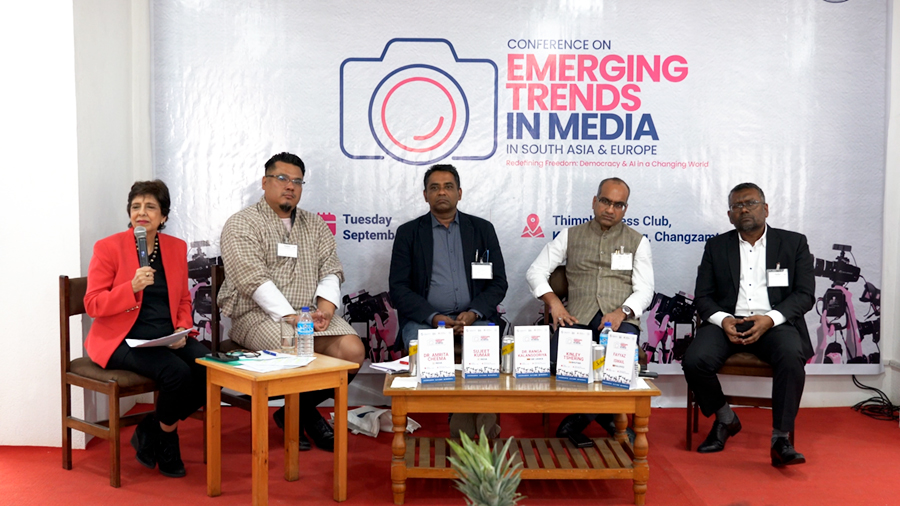
Experts from Bhutan, Europe, and South Asia gathered in Thimphu to explore the ‘Emerging Trend in Media in South Asia and Europe’. The conference held yesterday discussed the multifaceted landscape of freedom of speech and the impact of artificial intelligence, AI, on elections.
 The conference featured two panel discussions focusing on navigating freedom of speech and the impact of artificial intelligence on elections, focusing on various aspects of the two topics.
The conference featured two panel discussions focusing on navigating freedom of speech and the impact of artificial intelligence on elections, focusing on various aspects of the two topics.
“The main aim of the conference, titled ‘Emerging Trend in Media in South Asia and Europe’ is to understand the changes and transformation in the media landscape not just in Bhutan, not just in South Asia but also in Europe. So, to understand the issue properly we have invited experts from Germany, Europe, Bhutan, and India,” said Needrup Zangpo, the executive director of Bhutan Media Foundation.
During the panel discussions, a speaker from Sri Lanka mentioned the challenges faced in maintaining a free press globally.
“The fourth estate of democracy, we call the independent media is being captured either by political or economic interest. So, the due role of the watchdog is missing now. People have started losing trust,” said Ranga Kalansooriya (PhD), media/political analyst, Sri Lanka.
He also added that content creators and social media influencers are also challenging the journalists by creating content without journalistic procedure such as fact checking and editorial processes.
With the emergence of AI in election campaigning in the region to influence voters, it is also used by politicians to send personalised messages across linguistic divides to establish contact with voters.
This new development is leaving media professionals questioning the authenticity of online content that could potentially impact voting patterns and election results.
“Imran khan was removed from office through a vote in the Pakistani Parliament. He is currently in jail. He turned to AI. AI Imran Khan speaking to the voters. On December 17,2023 the re was a video published by his party went live and 8.5 million people watched Imran Khan address the nation not knowing that this was not the real Imran Khan,” said Waqar Rizvi, a Canadian-Pakistani journalist.
Discussing on the various aspects of the usage of AI, the speakers had contrasting opinions on the case of Al being an equaliser and divider of society.
“A few years ago, there was an initiative to start a newspaper where they would translate it simultaneously in different languages but it is so much work and you can never be on point. Using Al for translation can be a positive impact of how it could equalise,” said Anna Sawerthal (PhD), editor at DER STANDARD, Austria.
“For Pakistan, it is just not the case. It will be the divider of the society. We have a huge digital divide in Pakistan. 48 per cent of Pakistani population does not have stable internet connections, 27 per cent cannot differentiate between an Al-produced video and a normal video,” said Waqar Rizvi, a Canadian-Pakistani journalist from Pakistan.
Organised by the Bhutan Media Foundation and the Friedrich Naumann Foundation for Freedom South Asia, members of the Thimphu Press Club and foreign delegates attended the event.
Pema Tshomo
Edited by Kipchu










